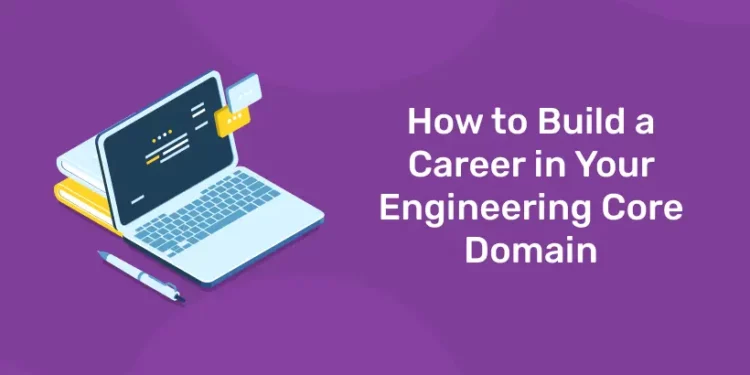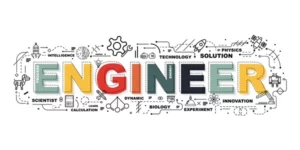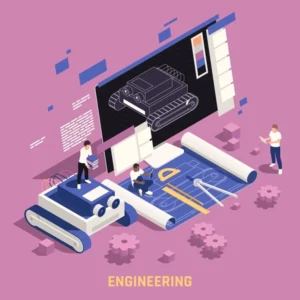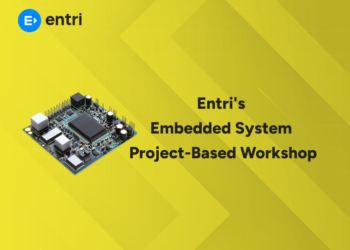Table of Contents
Imagine designing India’s next smart city or powering electric vehicles as a core engineer. Engineering offers endless possibilities for those passionate about innovation and problem-solving. Yet, NASSCOM reports that 60% of India’s 15 lakh engineering graduates in 2025 join IT jobs due to family pressure or quick opportunities, despite studying core domains like mechanical, electrical, or civil. While switching to IT or MBA paths isn’t wrong, it risks disconnecting from your passion. Building a Career in the Engineering core domain offers long-term rewards, specialized expertise, and impactful contributions. The Entri MEP Course equips you with NSDC-certified skills in MEP drafting, unlocking high-demand roles. Ready to thrive in India’s engineering boom? Ready to Build a Career in Engineering core domain?
Why Choose a Career in Your Engineering Core Domain?
India’s engineering sector is booming, with construction and renewables leading job growth. TeamLease notes 60% employability in core engineering in 2025, up from 46% in 2021. Yet, many graduates flock to IT, ignoring core domains like electrical, mechanical, or civil. Switching fields may offer quick salaries, but staying in your core domain leverages passion, builds expertise, and ensures long-term success. Entri’s MEP Course trains you for roles like electrical draftsman, aligning with India’s infrastructure surge. Here’s why core engineering matters.
Benefits of Staying in Your Core Domain
-
Passion-Driven Work: Pursuing mechanical or electrical engineering keeps you connected to your interests, unlike generic IT roles.
-
Specialized Expertise: Core knowledge sets you apart, enabling innovations in smart grids or sustainable buildings.
-
Career Longevity: Payscale reports 20% higher salaries for experienced core engineers vs. IT generalists by 2030.
-
Industry Relevance: Staying updated with trends like EV technology ensures employability, per LinkedIn’s 18% job growth data.
The Entri MEP Course boosts your core skills with live projects and placement support, making you a top candidate.
List of Various Engineering Core Domains
Names of some of the engineering core domains are listed below.
- Marine Engineering
- Aeronautical Engineering
- Metallurgical Engineering
- Robotics Engineering
- Ceramic Engineering
- Civil Engineering
- Industrial Engineering
- Chemical Engineering
- Structural Engineering
- Environmental Engineering
- Mechatronics Engineering
- Electronics Engineering
- Power Engineering
- Textile Engineering
- Marine Engineering
- Aerospace Engineering
- Petroleum Engineering
- Biomedical Engineering
- Production Engineering
- Communications Engineering
- Mechanical Engineering
- Construction Engineering
- Electrical Engineering
- Mining Engineering
- Telecommunication Engineering
- Tool Engineering
- Automobile Engineering
- Biotechnology Engineering
- Transportation Engineering
- Computer Science Engineering
Get certified and become a MEP draftsman! Click to attend the Demo classes!
Master MEP Design with Industry-Leading Training!
Gain in-depth knowledge of Mechanical, Electrical, and Plumbing (MEP) Design with expert-led courses. Learn HVAC, fire safety, sustainable building strategies, and BIM applications to excel in the construction industry.
Know MoreBenefits of Staying in Your Engineering Core Domain
Staying connected to your engineering core domain has many benefits. A few of them are discussed below.
Staying Connected to Your Passion
Most people who wish to stay in their core domain are the ones who chose their engineering core because of their passion for that subject. When you continue in the same field you are choosing to stay aligned to your passion and interests. As you have acquired some knowledge in the domain during your education, you can take it and apply it in real-life situations for problem solving without any special training which is not something you can do if you change the fields. Staying in your core discipline will keep you up-to-date with the latest industry trends, advancements and research. This can open gates to innovations and developments within your chosen field. When you stay in the core domain, you have the advantage of having the set of unique knowledge that sets you apart from all other engineering domain students.
Making the differentiation through Value Addition
You can pursue a post-graduation, doctoral degree or even fellowship if you continue in your engineering core domain. You will have the advantage of the opportunity for specialised learning which will indeed add to the value of your resume and set you higher than others in this competitive job market. People who change the domains lose this advantage.
Bank and IT jobs give better salaries in the beginning. So, it is unavoidable to discuss prioritising the career instead of long-term value addition. But IT and banking jobs require a wide range of skills rather than specialisation in an engineering discipline. Going into other fields prevents you from gaining in-depth knowledge and expertise in your focused niche. This can be detrimental to career growth in the long term and in giving meaningful contributions in the core engineering domain.
Career Growth in Core Engineering Domains
The statistics show that core engineering domains lacking growth opportunities are just a popular myth. There are multiple potential platforms for growth. Engineering is one of the largest sectors in India. The employability of Indian youth increased from 46% in 2021 to 57% presently. So, we can surely say that there is somewhat of a positive growth in the engineering job market. Among various sectors construction industry holds the position of highest contribution. For the next five years till 2026, the market estimates show positive growth prospects.
There was a leap in the industry in demand for specialised roles in the financial years 2025-2026. Such roles were essential for project delivery fortifying and improved process performance. With the continued growth in the sector, the demand for employees with specific core engineering domains as their main subject will increase.
Since construction is the sector which contributed the most to the employment of engineers, there is a course engineering diploma holders and engineering graduates from disciplines like mechanical engineering and electrical engineering should know about. MEP drafting is a profession that is rising in demand nowadays. Entri App is providing the best MEP course with certification, recorded and live online classes, live projects and site visits. That too in multiple languages. Placement assistance is also provided for all the joining candidates. The possible career opportunities after taking the course are listed below.
- Electrical Draftsman
- HVAC Draftsman
- Mechanical Draftsman
- Coordination Draftsman
- Junior Engineer
- Drafter / Overseer in Kerala Govt.
- Tendering Dept. Quantity Take-off Drafter
This is indeed a golden opportunity for engineers from such disciplines to stay in a career within their engineering core domain.
Career Growth and Income Rise
The automotive sector has shown a significant rise in employment, a 45% leap from the numbers in the year 2019. This trajectory continued to 2023 and is expected to do the same into the foreseeable future. When considering the remuneration aspects. IT and Bank jobs indeed give better entry-level salaries. This is because the training and familiarisation in core engineering domain jobs might take a longer time. This might be as short as six months or as long as three years. The processes involved in these domains are complex and hence the training has to be more comprehensive for the candidate to understand the intricacies of working in the field.
However, once an engineer gains experience and expertise, career and remuneration growth become more apparent. The salary packages in the core engineering domains are designed with the long-term oriented idea that the employee will earn more as they advance in their knowledge as well as career. When we take into account these factors, we can understand that the core engineering domain careers are just as earning, if not more financially profitable than other options discussed above in the long term. Having an excellent mentor is the key for people who are passionate about their subject and want to build their career in a core engineering domain.
Enrol in the MEP course for better career opportunities in your field! Join today!
Government Initiatives to Boost Engineering Core Sectors in 2025
India’s government, led by PM Narendra Modi, is supercharging core engineering sectors like mechanical, electrical, and civil engineering to fuel economic growth. With $600 billion projected for infrastructure by 2030, per McKinsey, initiatives aim to enhance skills, attract investments, and create jobs. These efforts drive demand for engineers in construction, renewables, and automotive, making 2025 a prime time for core domain careers. The Entri MEP Course equips engineers with NSDC-certified MEP drafting skills, aligning with government-backed opportunities. Here are key initiatives propelling engineering growth:
-
Advanced Technology Platforms: Six platforms accelerate innovation in robotics and manufacturing, per NITI Aayog. They empower engineers to develop cutting-edge solutions, boosting global competitiveness and job creation for mechanical and electronics engineers.
-
PLI Scheme for Automotive: A ₹26,000 crore Production Linked Incentive scheme targets auto components, aiming for ₹45,000 crore in investments by 2027, per Ministry of Commerce. This creates thousands of mechanical engineering jobs, especially in EV technology.
-
Vehicle Fleet Modernization: The ₹12,000 crore program promotes eco-friendly vehicles, driving demand for aerospace and electrical engineers. X posts highlight 20% job growth in EV-related roles by 2025.
-
Telecom PLI Scheme: A ₹12,500 crore initiative boosts 5G equipment manufacturing, per DoT. It fuels electronics engineering jobs, with 25% higher demand for telecom engineers, per Naukri.
How to Build a Career in Your Engineering Core Domain?
Build a Career in Engineering core domain can be a more rewarding journey to people fully committed to their passion than short-term benefits. Here are some tips that will help you to build your career in an engineering core domain.
Finding the Right Domain
A student has to do lots of self-exploration and have to do deep thinking about their passion, strengths, weaknesses, specific skills, job preference, relocation abilities as well as the employability of various domains in the present job market before choosing their engineering core domain. All these factors along with the salary range should align with your long-term goals.
Setting the Career Path
You should have a very clear idea about the chosen domain, then fix a career path that suits you and stay committed to it. Break your long-term ideas into several short-term ones and execute them one by one. You have to have a major discussion with a mentor or expert in the field and create a roadmap for the job that you fancy. This roadmap will help you to stay motivated and navigate your education and career without much confusion.
Education, Skilling and Training
You have to choose an educational path that is well suited for the Build a Career in Engineering you have fixated on. If possible, study in a very reputed institution with good placement. You have to decide the level of education you need. Whether you want to do a diploma stop at a graduate degree or go for a master’s or even doctoral level. But the skill development doesn’t end in the college education. Engineering is a very dynamic field. Innovations are happening at a fast pace and to stay relevant in the career market you have to keep yourself updated on every new piece of knowledge. Attending workshops, seminars and online courses can help you stay up to date in your knowledge.
Making Contacts and Networking
In an engineering domain, networking might not have as much importance as in a business domain. But irrespective of the domain you work in, this is a corporate world. Networking is the key to career advancement here. So, make sure that you attend the events organised by industry, be a member of online forums and communities, join professional associations and hence make beneficial connections with people who could be mentors or peers. A strong professional network will bring the right help and right advice at the right time. It can even open the doors to job opportunities, research funding and valuable collaborations.
Experience and Practical Knowledge
Gaining experience in the field can start by applying for internships and other Co-op pogroms. This will help you get hands-on experience. Practical experience will enhance your skills. It will also provide priceless perceptions of the real-life applications of the theoretical knowledge you gained during your education.
Build a Portfolio
Build a portfolio that showcases your engineering projects, certification and other achievements. There should be detailed descriptions, photos, graphs and other quantifiable results and the improvements that were achieved as a result of your project. A well-made portfolio can impress your potential employers and clients giving you an advantage over other candidates who might not have one.
Keep yourself Updated
As discussed before, engineering is a field in which constant innovations are happening. So, keeping up with the latest technologies and adapting your skillset to match the latest trends and demands of the industry is very necessary. Earning professional certificates from authentic sources is a very good idea for gaining knowledge of the latest innovations. This will not only give you a new set of skills but also show your commitment to continuous improvement, learning and professional development. You can also subscribe to industrial publications and attend seminars for the same purpose.
Communication Skills
Communication is a game-changer for engineers. Explaining complex designs to non-technical clients or collaborating with teams requires clarity. In 2025, Indian projects like smart grid rollouts need engineers who simplify technical jargon. Glassdoor notes 10% higher salaries for communicative engineers. Poor communication risks project delays, costing millions. Entri’s MEP Course builds communication Skills needed for electrical engineers for client pitches and team coordination, enhancing project success. Speak clearly—your words power collaboration. Entri also provides Cambridge English class for engineers for there professional growth.
Seek Guidance and Mentorship
A mentor who is a senior or an expert in your core domain can give you invaluable guidance. They can help you avoid mistakes that people without mentors may learn from trial and error. So, finding someone who can share their experience, advise you and give constructive criticism on your project is very essential for your career growth. The guidance of an expert may help you navigate the problems with support and make informed decisions at career and project crossroads.
Join the best MEP draftsman course to better your resume! Click for more details!
Master MEP Design with Industry-Leading Training!
Gain in-depth knowledge of Mechanical, Electrical, and Plumbing (MEP) Design with expert-led courses. Learn HVAC, fire safety, sustainable building strategies, and BIM applications to excel in the construction industry.
Know MoreConclusion
In conclusion, we can say that Build a Career in Engineering core domain requires dedication, continuous learning, flexibility, communication, networking, mentorship and gaining practical experience. Keeping this advice in mind will help you excel in your engineering core domain instead of diverting your career into other fields.
Master MEP Design with Industry-Leading Training!
Gain in-depth knowledge of Mechanical, Electrical, and Plumbing (MEP) Design with expert-led courses. Learn HVAC, fire safety, sustainable building strategies, and BIM applications to excel in the construction industry.
Know MoreFrequently Asked Questions
Which are the careers that engineers choose to go to instead of their core domain?
The careers that engineers choose to go instead of their core domain are the IT sector, business and banking.
Which is the sector that is showing constant and promising growth in employing engineering graduates in job roles with importance to core engineering domains?
The manufacturing industry is the sector that is showing constant and promising growth in employing engineering graduates in job roles with importance to core engineering domains.
What is a career in an engineering core domain?
A career in engineering core domain involves working in fields like mechanical, electrical, civil, or electronics engineering, applying specialized skills. In 2025, India’s construction and energy sectors drive demand, with 57% employability, per TeamLease. Staying in your core domain leverages passion and expertise, unlike switching to IT or management.
Why should engineers stay in their core domain?
Staying in your engineering core domain aligns with passion, builds specialized expertise, and offers long-term growth. NASSCOM notes core domains like construction lead employment, with 15% job growth by 2026. Unlike IT jobs, core roles provide unique knowledge, boosting resume value. Entri’s Quantity Surveying Course enhances core skills like MEP drafting, ensuring competitive advantage in India’s 2025 job market.
What are the benefits of a core engineering career?
A career in engineering core domain offers passion-driven work, specialized knowledge, and career growth. TeamLease reports 57% employability in 2025, with construction leading. Core engineers earn 18% more with experience, per Payscale, and access innovative projects. Entri’s Quantity Surveying Course provides NSDC-certified training in MEP drafting, preparing you for high-demand roles like electrical draftsman in India’s infrastructure boom.
How does MEP drafting help core engineering careers?
MEP drafting enhances core engineering careers in mechanical and electrical fields, focusing on HVAC, electrical, and plumbing systems. Demand for MEP draftsmen is rising, per Naukri, with 20% higher salaries for certified professionals. Entri’s MEP Course offers NSDC-certified training, live projects, and site visits, preparing you for roles like coordination draftsman in 2025’s construction sector.














